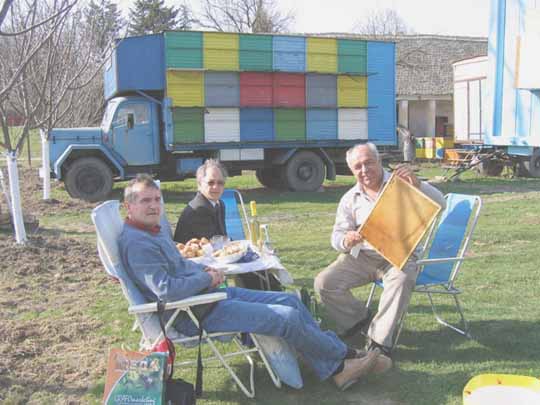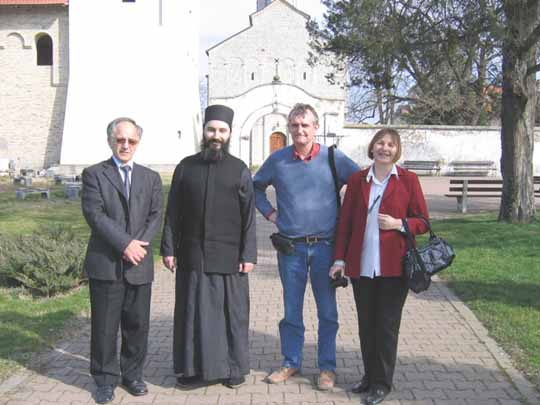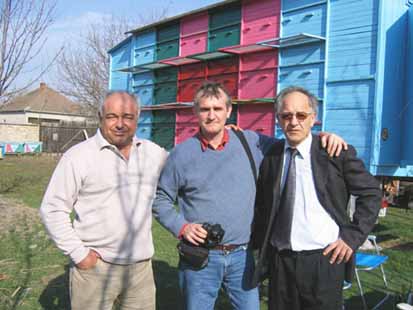English Home
Interview with Henry Clement the
president of National Union of French Beekeeping (UNAF)
For
the survival of bees and beekeeping
|
1. Mr. Clement, would you please present our
site visitors with some basic information about beekeeping in France.
(H.C):
It is with great pleasure that I will try to give you some information about
the situation in French beekeeping and its development during the past few
years.
|

|
2. Is it
true that there are around 2000 professional beekeepers in France? How many
hives do they have and how much honey do they produce?
(H.C):
There are 70000 beekeepers in France, most of whom (90%) are small beekeepers
who own a few hives only, from 5 to 10 predominantly. There are also 2000
professional beekeepers whose only income comes from honey and bee products they
produce. They own between 200 and 400 hives at average, but some of them have
2-3000 and employ workers to look after the hives. Finally, there are between
4000 and 7000 beekeepers who have from 30 to 150 hives and for whom beekeeping
is an additional occupation to their main job. Nowadays France has 1250000 hives
which produce around 20000 tons of honey in one year. In 1995 we had 1350000
hives and produced 33000 tons of honey, but those were happy times before the
occurrence of problems with Gaucho and Regent…
3. Can we say that French beekeeping is recovering and
advancing after great losses of colonies and bees in previous years? We learned
that in 2006 France exported honey again, which is certainly a sign of progress.
(H.C):
Since the withdrawal of Gaucho and Regent, based on imidacloprid
and fipronil, the colonies grew evidently stronger. The loss of colonies, which
during those years had been 30 – 40%, now went to the natural level of 4-10% a
year. However, the production did not increase since beekeepers were no longer
feeling safe about sunflower, and sunflower honey made 50% of French production
in 1995. Meteorological conditions were also unfavourable. In 2007 only rape and
acacia had good honeyflows. So, the year was not as good as we expected.
4. Can you explain the organization of beekeepers in France? We heard
that French beekeeping is specific since it has many beekeepers’ associations.
What is their role?
(H.C): France is administratively organized in 90
departments which divide its territory. This division is rather old and every
department has a beekeeping association which is more or less influential
depending on the importance of beekeeping and its tradition in the department.
The national beekeeping union, of which I am the president, has existed since
1945 and groups more than 90 department associations. Therefore, we have 22000
members which own more than 500000 hives. The role of the Union is to protect
the bees and beekeeping activities. We have constant relations with the Ministry
of agriculture concerning all the beekeeping issues and we negotiate certain
types of support to beekeepers, like supporting the purchase of relocation
equipment, cranes, loaders… We also fought the authorization of putting
phytosanitary products on the market. Thanks to
our legal action and scientific results Gaucho was retreated from the
sunflower in 1999 and then from corn in 2004, while Regent was withdrawn
from agriculture in 2004. Furthermore, we intervened in Brussels concerning
beekeeping regulations (honey directives, honey regulations…)
5. Here is an always important subject for beekeepers: what is the price
of honey in France retail and wholesale? What sorts of honey are the most
expensive and what are the prices of imported honey?
(H.C): 50 % of honey
produced in France is sold directly by the beekeepers. This results in great
connection with consumers. The price of honey varies from 4 to 9 € for 500 grams
package, depending on the origin of plant and the location of purchase. The most
expensive sorts of honey are fir honey, lavender honey, heather… There is a
growing demand for strong taste sorts of honey like chestnut or heather honey.
6. What diseases present the greatest problem for French beekeepers? Do
beekeepers and their associations cooperate with veterinary services concerning
diagnosis and treatment of bee diseases?
(H.C): In France,
like in other parts of the world, there is varroa, nosema, American foulbrood…
There is a sanitary defence group in every department which deals with sanitary
issues together with state officials. On the other hand, there are not many
veterinarians who are educated in beekeeping, but in cooperation with two
veterinary schools we have plans for this specific work education.
7. What can you tell us about the long struggle of French beekeepers
against poisoning of the bees with products like Gaucho and others? What is the
present condition like?
(H.C): We won thanks
to great energy. The scientists provided us with proofs for the responsibility
of these products. We also engaged in a great legal struggle which resulted in
our four times victory on the State Council, which is the highest judiciary body
in France. We learned to communicate with the broad public in order to unite in
defence of the bee. Those three foundations – scientific, legal and
communication were decisive in this kind of struggle.
8. We heard of new and dangerous insect in the
south of France – Asian hornet (Vespa
velutina). Is there any damage to bee
colonies and how did people react to this pest?
(H.C): Asian hornet
appeared in France four years ago in Chinese pottery in Bordeaux area on the
cost of Atlantic. After that it spread over one third of France through the
waterways. When their impressively large nests are close to the hives, which is
often the case, it causes a disaster since hornets destroy the bees and colonies
perish completely robbed. Females queens which fly around hives and build new
nests should be hunted and destroyed and existing nests should be ruined. But,
for now we are much confused and unequipped…
|
9. Are you familiar with Serbian beekeeping and
what do you think of it? What would you recommend Serbian beekeepers to do
to advance more in this field? |
 |
|
(H.C):
I was surprised with the great number of beekeepers present in Novi Sad and
amazed by the professionalism of the beekeepers I visited. Until now I have
never seen hives built in a vehicle. It is very interesting and spares
people from troubles. If your bees don’t get poisoned with pesticides, I am
convinced that Serbian beekeeping has great future.
|
| |
At
Dusan and Milanka Vorgic's apiary in Gardinovci (near
Novi Sad, Serbia). From the left: Clement, Stojanovic, Vorgic)
|
10. You were a guest at beekeeping seminar in Novi Sad in 2008. What was
the subject of your presentation and could you introduce it shortly to the
visitors of the site?
(H.C): I presented
French beekeeping with all advantages and dangers which it encounters. I also
presented the struggle that our union fought against phytosanitary products
Gaucho and Regent which had a dramatic influence on French
beekeeping.
 |
|
|
In Monastery Kovilj, near Novi
Sad |
|
11. Beekeepers are always curious to learn something about the personal
beekeeping activities of an interviewed beekeeper. Would you tell us something
about it? What beekeeping represents for you personally?
(H.C): Bee is a
wonderful insect. Beekeeping is an activity which cannot be successful if there
is no love for the bees. It is a difficult activity which requires great
experience, constant observation and knowledge of biology, botany, economy and
technology. It is an activity with nature and beekeepers are truly necessary for
its constant development. The bee is the protector of our environment which
works for the benefit of biodiversity and of variety and quantity of our
nourishment.
12. How much do people use bee products as medical
treatment in France? Is apitherapy used in your country?
(H.C):
At average the French use 600g of honey per capita a year. The consumption of
pollen, propolis and royal jelly is constantly growing. Apitherapy is gradually
developing.
Mr. Clement, thank
you very much for the conversation. We wish you and all French beekeepers
successful beekeeping.
Interview
taken in March 2008 through e-mail
Interview
taken by Predrag Cvetkovic
Assistance
during interview: Zivoslav Stojanovic
French translation
by Stasa Abramovic, Predrag Cvetkovic
English translation by Oliver Mihajlovic



